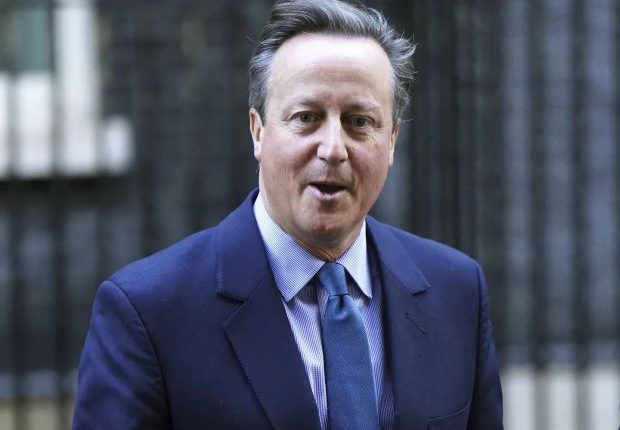David Cameron returns to UK government in cabinet reshuffle

By Stephen Castle
LONDON – Prime Minister Rishi Sunak of Britain on Monday (13) fired Suella Braverman, one of his most senior and divisive ministers, in a shuffle of his top team that brought one of his predecessors, David Cameron, unexpectedly back into government as the foreign secretary.
Critics had argued that Braverman, who as home secretary had been responsible for law enforcement, immigration and national security, had stirred tensions by publishing a contentious opinion article ahead of a huge, pro-Palestinian demonstration in London on Saturday (11). In that article, she referred to protesters as “hate marchers” and criticized the police.
Though the removal of Braverman from her job had seemed likely since her article was published last week, Sunak appears to have delayed making the change for several days to carry out a long-awaited and wider shuffle of his Cabinet.
The appointment of Cameron is an extraordinary turn for a former prime minister who is perhaps most remembered for calling the 2016 referendum that led to Britain’s departure from the European Union. Cameron campaigned for Britain to remain in the bloc, and when it voted to leave by a narrow margin, he resigned.
Braverman has long been a divisive figure at the heart of the governing Conservative Party; her provocative rhetoric and hard-line stance on immigration has won her support on the right while alienating more moderate colleagues.
She is widely viewed as a possible candidate to replace Sunak as party leader if he fails to win a looming general election, and her departure signals the deep challenges he confronts, including running way behind Labour in opinion polls, battling a stagnant economy and managing a restive party that senses its 13-year grip on power slipping. Some analysts said the return of Cameron was aimed at returning the party to a more moderate footing.
Here are the latest developments:
— Braverman was replaced at the Home Office by James Cleverly, who had held the position of foreign secretary, Downing Street said in a statement.
— Cameron said he had “gladly accepted” the post of foreign secretary at a moment when Britain faces a “daunting set of international challenges,” including the war in Ukraine and the crisis in the Middle East. In a statement, Cameron noted that he “may have disagreed” with some of Sunak’s decisions but called him a “strong and capable prime minister” showing “exemplary leadership”.
— Since Cameron was no longer an elected member of Parliament, Downing Street said that he would be given a place in the House of Lords — the essentially consultative second chamber of Parliament — in order to become foreign secretary. Stella Creasy, a lawmaker from the opposition Labour party, said that Cameron’s unelected status raised questions about his accountability.
-New York Times


Comments are closed, but trackbacks and pingbacks are open.